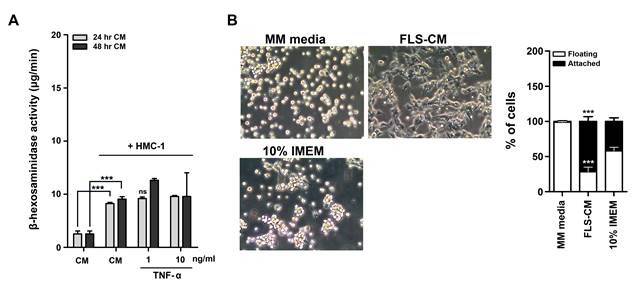Session Information
Date: Tuesday, November 10, 2015
Title: Rheumatoid Arthritis - Human Etiology and Pathogenesis Poster III
Session Type: ACR Poster Session C
Session Time: 9:00AM-11:00AM
Background/Purpose:
A
number of studies have shown that synovial mast cells (MCs) are activated, and
elicit a pro-inflammatory role in rheumatoid arthritis (RA). Synovial MCs are
located around the microvasculature, but also adjacent to the synovial lining
and subsynovium where synovial fibroblasts (SFs) reside. Despite that mediators
produced by MCs have been demonstrated to activate SF, the effector function of
SF on MC activation is not well known.
Methods:
In vitro SF cultures were obtained from knee synovium of RA
patients. Co-culture of SF (2.5×104 cells) and human mast cell
(HMC)-1 line was done with IMEM phenol red free media including 10% fetal
bovine serum in a 24 well plate. We used the b-hexosaminidase (HXSA) assay as
the readout for MC degranulation (1, 6, 12, 24 hours) after direct/indirect co-culture
or PMA/ionomycin treatment. HMC-1 was treated with SF conditioned medium (SFCM)
to study migration, cytoskeletal rearrangement, proliferation, and
degranulation. Antibody based proteins array was utilized to assay cytokines
increased after SF/HMC-1 co-cultures.
Results:
Indirect,
as well as direct co-culture of SF/HMC-1 showed significantly increased activity
of b-HXSA compared with controls. HMC-1 primed in SFCM for 48 hours burst out
3.6 times of b-HXSA activity compared with naïve HMC-1. In addition, HMC-1
transformed into a spindle-shaped cell after cultured in SFCM for 24 hours; surface
adherence increased up to 58.3 times compared with cells in control media
(figure). Moreover, not proliferation, but HMC-1 migration was induced in the
SFCM environment; 2.3 times more than controls. Co-culture of SF/HMC-1
significantly induced soluble interleukin 1
receptor-like 1 (or ST2) and cytokines associated with cell migration or
adhesion (endoglin, urokinase receptor (uPAR)).
Conclusion:
Our data indicate
that interactions between RA SFs and MCs, independent of direct contact, result
in activating MCs into migratory, innate effector cells in the synovium.
Figure. (A) Increased HMC-1 b-hexosaminidase activity (24 hours) after treated with
rheumatoid arthritis synovial fibroblast conditioned media (CM). (B)
Transformed HMC-1 cells after treated with CM (24 hours).
To cite this abstract in AMA style:
Lim HS, Choi J, Song YW, Shin K. Rheumatoid Arthritis Synovial Fibroblast Potentiates Mast Cell Degranulation and Migration Independent of Cell-to-Cell Contact [abstract]. Arthritis Rheumatol. 2015; 67 (suppl 10). https://acrabstracts.org/abstract/rheumatoid-arthritis-synovial-fibroblast-potentiates-mast-cell-degranulation-and-migration-independent-of-cell-to-cell-contact/. Accessed .« Back to 2015 ACR/ARHP Annual Meeting
ACR Meeting Abstracts - https://acrabstracts.org/abstract/rheumatoid-arthritis-synovial-fibroblast-potentiates-mast-cell-degranulation-and-migration-independent-of-cell-to-cell-contact/

